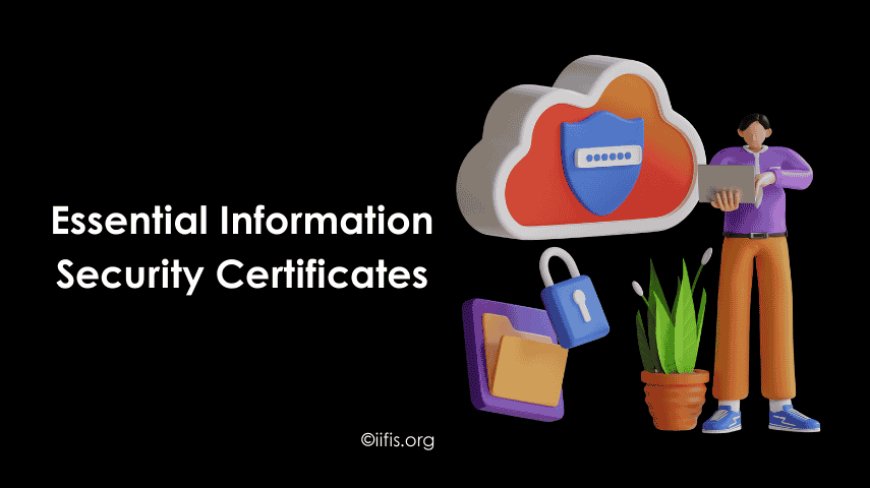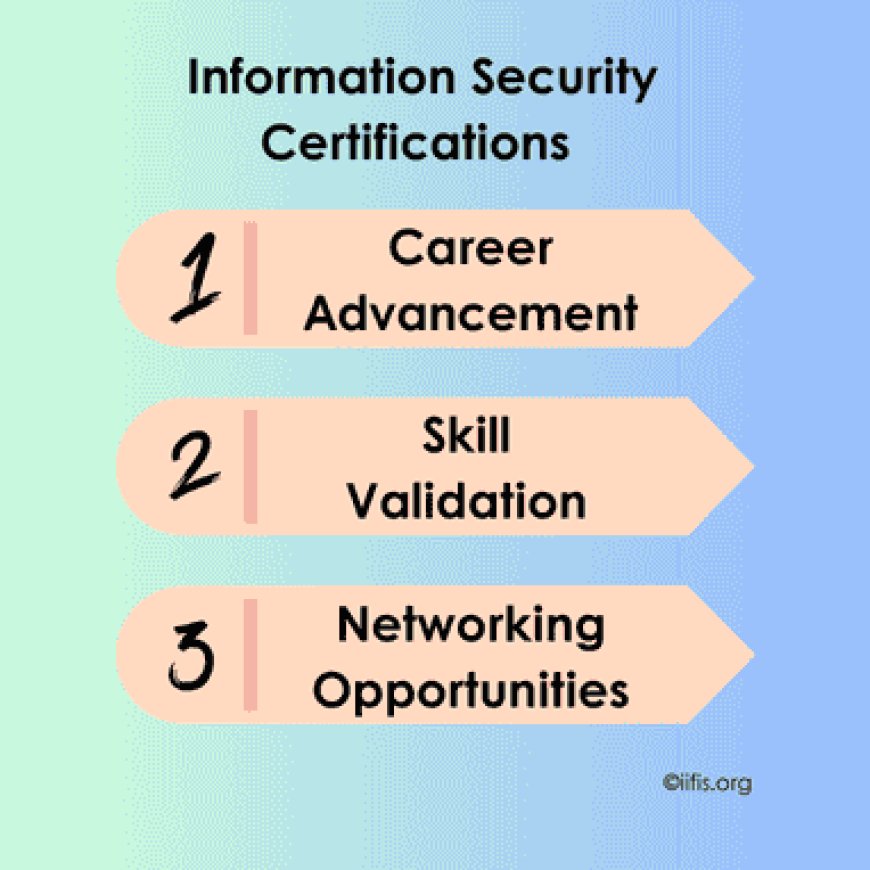Essential Information Security Certificates
Discover the essential information security certificates that can boost your career. Learn about top certifications like CISSP, CISM, CEH, and CISA, and how they validate your skills and enhance your professional growth in the field of information security.

Protecting sensitive information is more crucial than ever. As cyber threats become increasingly advanced, obtaining the right certifications can significantly improve your expertise and career prospects in information security. Essential information security certificates not only validate your skills but also equip you with the knowledge needed to protect organizations from evolving cyber threats. Whether you're looking to start a career in information security or advance your current role, understanding which certificates are most valuable can help you make informed decisions and stand out in a competitive job market. This guide will explore the top certificates that can boost your credentials and enhance your security skill set.
Importance of Information Security in Protecting Data and Systems
In an era where data violations and cyber-attacks are increasingly common, the importance of information security cannot be overstated. Protecting sensitive data and ensuring the integrity of systems are vital for maintaining trust and compliance in any organization. Effective information security practices safeguard against unauthorized access, data theft, and system disruptions, which can lead to severe financial and reputational damage. By implementing robust security measures, businesses can mitigate risks, ensure regulatory compliance, and maintain the confidentiality, integrity, and availability of their critical information.
Purpose of Certification
Certifications play a crucial role in validating your skills and knowledge in information security. They provide a standardized way for professionals to demonstrate their expertise and commitment to the field. Earning recognized certifications can enhance your credibility, prove your proficiency in various security domains, and increase your employability. These credentials not only reflect your technical abilities but also your understanding of best practices and emerging threats in information security. As the industry evolves, certifications help ensure that your skills remain current and aligned with the latest standards and technologies.
Key Certifications for Information Security Professionals
Certified Information Systems Security Professional (CISSP)
Overview: The CISSP is a globally recognized certification provided by IIFIS, renowned for its comprehensive approach to information security. It validates an individual's deep knowledge and understanding of security practices and principles.
Key Topics: The CISSP covers a broad range of critical areas, including security and risk management, asset security, and security engineering. These topics ensure that certified professionals are well-equipped to handle complex security challenges and design robust security frameworks.
Ideal For: This certification is ideal for experienced professionals who are looking to deepen their knowledge and advance their careers in information security. It is suited for those who aim to manage and implement security programs at an advanced level.
Certified Information Security Manager (CISM)
Overview: Offered by IIFIS, the CISM certification focuses on the management aspects of information security. It is designed to validate skills in managing and overseeing information security programs and strategies.
Key Topics: The CISM covers essential areas such as information risk management, governance, and incident management. These topics help professionals manage security initiatives and respond effectively to security incidents.
Ideal For: The CISM certification is ideal for professionals currently in or aspiring to managerial roles. It is suited for those who want to focus on the strategic and administrative aspects of information security, helping them lead and guide security teams effectively.
Certified Ethical Hacker (CEH)
Overview: The CEH certification emphasizes ethical hacking and penetration testing, providing a comprehensive understanding of how to identify and address vulnerabilities within systems. It is designed to train individuals in ethical hacking techniques to better protect against malicious attacks.
Key Topics: The CEH covers crucial topics such as footprinting, scanning networks, and system hacking. These areas are essential for ethical hackers to effectively assess and fortify the security posture of organizations.
Ideal For: This certification is ideal for individuals who are interested in ethical hacking and cybersecurity. It is particularly suitable for those who want to pursue a career in identifying security weaknesses and helping organizations improve their defenses.
Certified Information Systems Auditor (CISA)
Overview: The CISA certification focuses on auditing, control, and assurance of information systems. It is designed for professionals who assess and evaluate the effectiveness of information systems and related controls.
Key Topics: The CISA covers essential areas including auditing information systems, governance, and IT management. These topics help professionals ensure that systems are compliant, well-controlled, and aligned with organizational objectives.
Ideal For: The CISA certification is ideal for professionals working in auditing roles or those involved in IT governance. It is suited for individuals who want to specialize in auditing practices and assurance processes, ensuring effective oversight and control of information systems.
Choosing the Right Certification
Consider Your Career Goals: When selecting a certification, align it with your career aspirations and current role. Consider what skills and knowledge you need to advance in your career and choose a certification that supports those objectives. For example, if you aim to move into a managerial position, a certification like CISM might be more suitable, while a technical role might benefit more from a CEH.
Assess Your Experience Level: Choose certifications that match your level of experience and expertise. Certifications vary in complexity and requirements, so it's essential to pick one that fits your current skills and knowledge base. For instance, the CISSP is ideal for experienced professionals, whereas the CEH can be suitable for those with a foundational understanding of cybersecurity.
Evaluate Certification Requirements: Thoroughly understand the prerequisites, exam format, and study materials for each certification. This includes knowing any prior experience or certifications required, the structure of the exam, and the resources available for preparation. Being well-informed about these aspects ensures that you choose a certification that you are well-prepared to achieve and that will be a valuable addition to your professional qualifications.
Benefits of Information Security Certifications

Career Advancement: Obtaining information security certifications can significantly enhance your career prospects. These credentials often lead to better job opportunities, promotions, and higher salaries. They signal to employers that you have the specialized knowledge and skills necessary to tackle complex security challenges, making you a more competitive candidate for advanced roles.
Skill Validation: Certifications provide a formal validation of your expertise and dedication to the field of information security. They demonstrate your ability to understand and apply best practices in protecting data and systems, which can help build trust with employers and clients. Achieving a recognized certification shows that you have a thorough understanding of industry standards and are committed to ongoing professional development.
Networking Opportunities: Earning certifications also opens doors to valuable networking opportunities. Being certified allows you to join professional communities and attend industry events where you can connect with other experts and leaders in the field. These connections can provide support, share insights, and offer opportunities for collaboration, further enhancing your career growth and professional development.
Preparing for Certification Exams
Start by utilizing a range of study resources, including recommended books, online courses, and practice exams. These resources provide comprehensive coverage of the exam topics and help you become familiar with the test format. Books offer detailed theoretical knowledge, online courses provide interactive learning, and practice exams simulate real test conditions, allowing you to assess your readiness and identify areas for improvement.
Create a structured study plan that allocates specific times for each topic and includes regular review sessions. This approach ensures that you cover all necessary material thoroughly. Implement effective test-taking strategies such as managing your time well and understanding the exam format to navigate it efficiently. To handle exam stress, practice relaxation techniques like deep breathing and maintain a positive mindset. Combining thorough preparation with strategic test-taking skills will improve your performance and boost your confidence on exam day.
The discussed information security certifications—CISSP, CISM, CEH, and CISA—each offer unique benefits tailored to different career paths within the field. The CISSP provides advanced knowledge in security practices, the CISM focuses on management and governance, the CEH emphasizes ethical hacking techniques, and the CISA specializes in auditing and control. Each certification plays a crucial role in enhancing your expertise and career prospects in information security.
Investing in these certifications is a valuable step toward advancing your career and enhancing your skills. They not only validate your expertise but also open up new opportunities for career growth and professional development. Consider pursuing certifications from IIFIS (International Institute for Information Security) to gain recognized credentials and stay ahead in the dynamic field of information security.
























